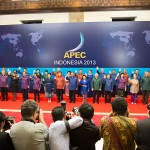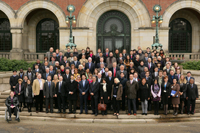 Paris is one of the most romantic cities in the world, so it comes as no surprise that France is a popular wedding location for many American couples. If your partner is a foreign national of France, there are certain preliminary steps you must take before your marriage can take place. First, at least one partner needs to have lived for at least 30 days in France and must provide proof of residence one month before the wedding. You will also need to provide your birth certificates, an affidavit showing no impediment to marriage, and a prenuptial certificate of health. Your birth certificates should be apostilled and the affidavit should be notarized by a notary public. Finally, you will need to display a public notice at the city hall where you are getting married at least 10 days before the wedding date. For more detailed information you may contact the French embassy or visit their website.
Paris is one of the most romantic cities in the world, so it comes as no surprise that France is a popular wedding location for many American couples. If your partner is a foreign national of France, there are certain preliminary steps you must take before your marriage can take place. First, at least one partner needs to have lived for at least 30 days in France and must provide proof of residence one month before the wedding. You will also need to provide your birth certificates, an affidavit showing no impediment to marriage, and a prenuptial certificate of health. Your birth certificates should be apostilled and the affidavit should be notarized by a notary public. Finally, you will need to display a public notice at the city hall where you are getting married at least 10 days before the wedding date. For more detailed information you may contact the French embassy or visit their website.
Apostille
Apostille in the Electronic Age for New Zealand
 Citizens of New Zealand who need documents to be certified for use overseas can now get them verified electronically, thanks to the new e-Apostille service from the Internal Affairs Authentication Unit.
Citizens of New Zealand who need documents to be certified for use overseas can now get them verified electronically, thanks to the new e-Apostille service from the Internal Affairs Authentication Unit.
E-Apostille can be used to certify marriage certificates, travel documents, letters from attorneys, and more. The system is expected to cut submission and processing times dramatically because it creates secure versions of paper documents that can be emailed overseas, instead of relying on mail or courier.
The e-Apostille makes getting an apostille quick and easy. It saves customers both time and money, and can make the difference between a customer making or missing an important deadline.
As of December 2012, New Zealand was one of only four countries in the Asia-Pacific region using e-Apostilles, though the success of this program could pave the way for other members of the Hague Apostille Convention to expand into electronic apostilles.
Scam Artists Trick Homebuyers with Fake Apostille
 A disturbing trend has emerged in home buying in Indiana and all over the country: scam artists tricking people into illegitimate home sales by using authentications from the Secretary of State to create the illusion that they own vacant property.
A disturbing trend has emerged in home buying in Indiana and all over the country: scam artists tricking people into illegitimate home sales by using authentications from the Secretary of State to create the illusion that they own vacant property.
The scammers call themselves “sovereign citizens.” They refuse to follow the law, do not accept the American government as legitimate, and are recognized by the government as domestic terrorists.
They use apostilles and authentications that are meant to be used solely for international business or other transactions that have absolutely nothing to do with property. Many people are not even aware that they have been targeted until they try to buy and sell property, at which point they have already fallen victim to the scheme.
Although previously the Secretary of State did not have the authority to reject financing statements or liens, it is now able to reject fraudulent filings. This new power will protect home buyers, civic leaders, and members of law enforcement from being conned by criminals.
APEC Member Economies Show Support for Apostille Convention Following Workshop
 In June 2013, the APEC Committee and the Asia Pacific Regional Office of the Hague Conference sponsored the Department of Justice of Hong Kong to host a workshop on the Apostille Convention for representatives of Member Economies of APEC. During the workshop, members learned about the benefits of adopting the Apostille Convention. Mainly, adopting the Apostille Convention will boost the effectiveness of APEC’s current initiative, the EoDB (Easy of Doing Business). This program will improve by making it easier to process international transactions and trading.
In June 2013, the APEC Committee and the Asia Pacific Regional Office of the Hague Conference sponsored the Department of Justice of Hong Kong to host a workshop on the Apostille Convention for representatives of Member Economies of APEC. During the workshop, members learned about the benefits of adopting the Apostille Convention. Mainly, adopting the Apostille Convention will boost the effectiveness of APEC’s current initiative, the EoDB (Easy of Doing Business). This program will improve by making it easier to process international transactions and trading.
Following the workshop at the APEC summit in Bali, Indonesia, the APEC Ministers maintained their positive opinion of the Apostille Convention. This is a good indicator that APEC will fully adopt the Apostille Convention within the next year or so.
Excellent Turnout at Apostille Convention Meeting on the Practical Operation of the Apostille Convention
 The third meeting of the Apostille Convention’s Special Commission on the practical operation of the Hague Convention on Abolishing the Requirement of Legalization for Foreign Public Documents was held during November 6~9, 2012. Over 160 experts from 75 States and international organizations attended the meeting.
The third meeting of the Apostille Convention’s Special Commission on the practical operation of the Hague Convention on Abolishing the Requirement of Legalization for Foreign Public Documents was held during November 6~9, 2012. Over 160 experts from 75 States and international organizations attended the meeting.
Of all conventions ratified by the Hague Convention, the Apostille Convention has been the most widely ratified (with 104 Contracting States). This is mainly due to Apostille’s relevance with people’s daily lives as well as cross-border business. The Convention has simplified the process of producing public documents abroad, including civil status certificates and notarial acts, as well as facilitate the circulation of public documents issued by one Contracting State for use in another, thus gaining extreme popularity throughout the world.
The Special Commission meeting allowed the Contracting States and interested international organization to discuss the Apostille Conventions’ operations. The discussed subjects included the applicability of the Convention, options that can further simplify the Apostille process, and options for the potential globalization of the successful electronic Apostille Program (e-APP), which is an innovative technological solution for modernizing existing Apostille procedures. To help designated Competent Authorities perform their functions under the Apostille Convention, the meeting also approved the final text of a Handbook on practical operation of the Apostille Convention.
Currently, more than 150 Competent Authorities throughout 15 Contracting States have already implemented at least one of the components of the Apostille Convention. Furthermore, thousands of e-Apostilles have been issued.